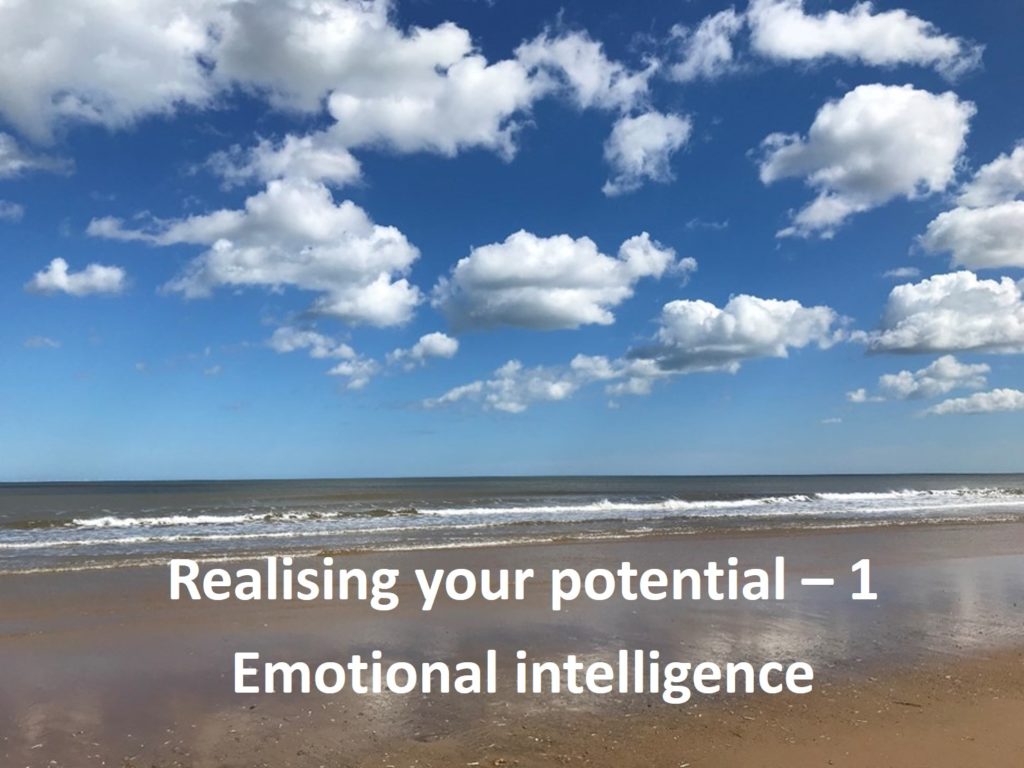
Emotional intelligence (EI) is very topical at the moment. It is often discussed as part of effective leadership but is equally important for interactions with all people at work. Understanding emotions can be very advantageous in helping you to realise your potential.
What is emotional intelligence?
A practical definition is:
“Emotional Intelligence is a collection of traits that can help people gauge social and emotional situations and interactions with others”
The elements of EI include:
- Self-awareness
- The ability to perceive your own and others’ emotions
- Self-motivation
- Being able to control your impulses
- Empathy
- Ability to manage stress effectively
- Optimism
- Modifying your behaviour to suit a situation
There are different ways of measuring EI and these fall into two broad categories – trait and ability.
- Trait – measures place people on a continuum for each of a series of self-perceived traits. This allows for shades of ‘grey’. There are no right or wrong answers.
- Ability – this considers EI as a cognitive ability that can be measured using performance tests with right or wrong answers.
Why does EI matter?
Self-awareness is a good start point for any development. From my experience of giving feedback sessions on EI assessments over the last couple of years, one of the most powerful ‘light-bulb’ moments for many is discovering that our emotional traits can be visible to others and the potential impacts that this can have. Once you are aware of your own traits you are also more likely to see them in others.
Understanding this and how it affects behaviour can help you to achieve your goals. It is important in work areas as varied as leadership and management, team and project work, selling and customer relationship management but it also matters in our personal lives. It helps us to understand how we appear to our family and friends too and why they behave as they do.
How do I find out what my EI is?
There are various tools available for discovering this. We favour looking at emotional traits assessments rather than ability. We believe this enables a more contextual based set of feedback. In other words, how your ‘scores’ relate both to your current situation and to where you want to be in the future.
We use the Thomas International TEIQue (Trait Emotional Intelligence Questionnaire) psychometric assessment. For more on the TEIQue go to https://www.thomas.co/recruitment/assessments/emotional-intelligence-tests
Our top five tips are:
- If you get the opportunity to find out about your EI – take it!
An assessment may be available to you within your organisation or as part of a training or development programme. If not, think seriously about doing an assessment on your own behalf. It is invaluable for your personal and career development.
When you do the assessment, be truthful in your responses. The first response that occurs to you is usually the right one so don’t overthink it! The TEIQue assessment can identify if there is an indication of ‘impression management’ so avoid the temptation to try to answer in a way that you think you should rather than what you actually feel. It is not a test!
- Be open to the results
We would always strongly advocate getting feedback from an experienced practitioner. This will give you far more insight than a report on its own can. It also avoids you having to try to interpret the findings on your own.
- There are no right or wrong answers!
We say this a lot during feedback. If you have followed the suggestions in Tip 1, the results will reflect your EI – they will be about you. Think about how your EI does and does not work for you in your current situation and where you might want to modify your behaviour in certain situations to be more effective or to realise your potential in the future.
Avoid looking at scores definitively. A score of 99/100 is not necessarily good and 20/100 isn’t bad! What works in your situation may not be right for others in theirs.
- Act!
Decide which elements of your EI results are priorities for you to focus on. Your feedback report should provide suggestions of helpful tips to consider. Don’t try to do it all at once. Act on the key ones first.
- Find a ‘sounding board’
Find someone in your organisation, that you can trust, who can give you feedback on how you act and appear in certain situations. Use this to assess where you can improve your interactions with others and how you are doing against the areas that you have identified to focus on.
Steve Bax is an accredited TEIQue Practitioner. Click here to read more and hear his interview with Cambridge Marketing College. For more help and advice on psychometric assessments including TEIQue please contact us today.
